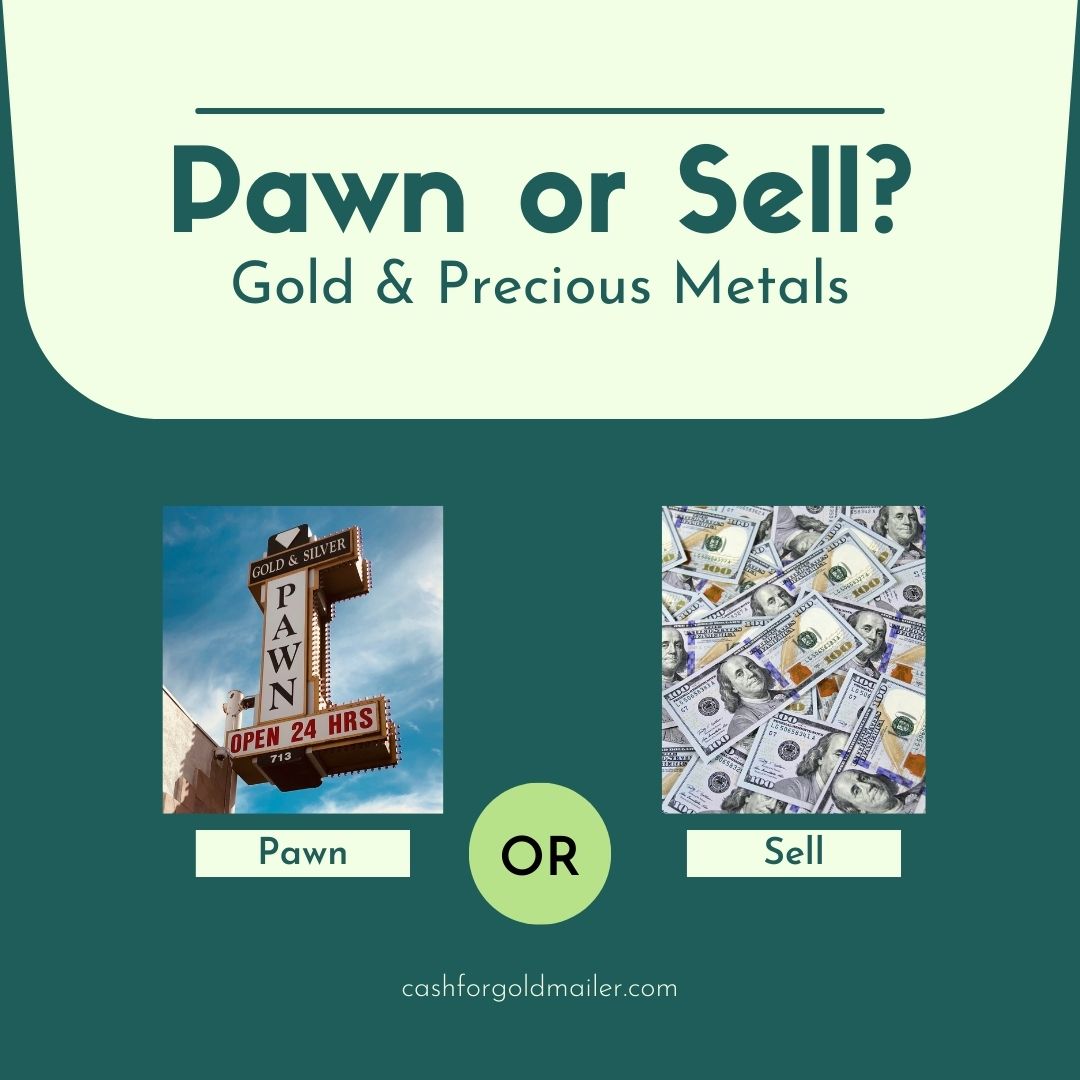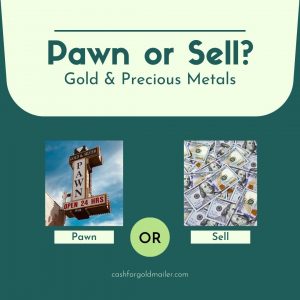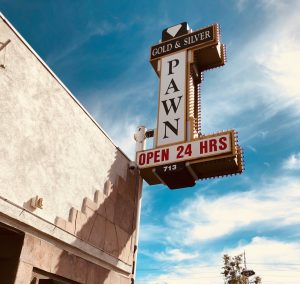
POSTED IN: Credit Card Debt, High-Interest Debt, Pawning Gold, Pawnshops, Selling Jewelry to Pawnshops

Life happens, and sometimes you need a bit of extra cash to get through the day. When that happens, you look for ways to get your hands on some cash, and fast. Often, the need for cash is seen as temporary until another paycheck comes in or you find a new job, but that isn’t always the case.
The problem with getting “fast cash” is that this cash is often very expensive. Payday loans, for example, can be obtained but offer extremely high interest rates (and are even illegal in some states). If you or someone you know has ever fallen behind on a payday loan, you know just how extreme those payments can get and how much you can end up owing. Any financial advisor will tell you this option is a bad idea.
Other people use credit cards for temporary expenses, carry high debt balances, and pay huge interest rates. This is an expensive idea too. We even get customers selling their gold to pay down credit card debt, which is typically a fiscally wise decision.
While there are other options to raise money quickly, the one we’re most concerned with here at Cash for Gold Mailer is people who want to use their precious metals to pay bills or get their hands on some cash quickly.
Pawning and selling gold are two different ways to use your gold items to obtain cash, and each option has its own advantages and considerations. Here’s a brief comparison:
What does it mean to pawn gold?
Pawning gold (or any other valuable) is basically just a cash loan that is guaranteed by an asset you agree to give up if you can’t repay the loan. Gold and silver have value, so you can take a (high-interest) loan against their value until you’re able to repay it.
- Process: In a pawn transaction, you provide your gold item as collateral for a loan. The pawn shop assesses the value of the item and offers you a loan amount based on that value.
- Interest and Repayment: You pay interest on the loan, and there’s usually a set period (such as 30 days) for repayment. If you don’t repay the loan within the agreed-upon time, the pawn shop may keep the item.
- Ownership: Until you repay the loan, the pawn shop holds ownership of the item. When it’s successfully repaid, you’ll get your items back.
What is gold selling?
Selling gold is much less complicated, and it’s what we do here at Cash for Gold Mailer (we are not a pawn broker)! Simply put, we offer you cash for your gold based on its intrinsic value. To learn more, see how it works.
- Process: When you sell gold, you outright exchange your gold items for cash. The buyer (such as a jeweler or gold buyer) assesses the value of the gold and offers you a price.
- Immediate Cash: Selling provides immediate cash, and you don’t have to worry about repaying a loan or interest.
- Ownership: Once the transaction is complete, you no longer own the gold item.
Should I pawn or sell?
There are a few things to consider when deciding between selling or pawning your gold. Let’s take a look at a few of them.
- Lowball Evaluations: If you’re pawning your gold, they may give you a much lower loan amount than you could get for selling the gold outright. This increases your risk. If you don’t come up with the money to pay off your pawn loan, not only have you paid some interest, but you’ve been forced to sell your gold for a low price.
- Interest Costs: Pawning involves interest payments – usually corresponding to high interest rates, so consider the total cost of the loan. Selling avoids these additional fees.
- Sentimental Value: If the gold item has sentimental value and you plan to reclaim it, pawning is really your only option.
- Market Prices: If you believe the price of gold is going to skyrocket in the short-term, then it could be more favorable to pawn your gold and buy it back. However, with the interest rates pawn shops charge, this is a highly unlikely situation.
From a financial perspective, pawning gold just doesn’t really make sense. You’re increasing your risk of selling for a low price, paying interest rates on an item with no sentimental value, or gambling on an increase in gold prices that almost never will match the interest rate you’re paying to the pawn broker.
All signs point to selling your gold for a fair price being your best option when it comes to getting your hands on cash.
What about sentimentality?
The only exception to the “better just to sell it rule” is if it holds sentimental value.
If it’s your grandmother’s old ring and is considered a family heirloom that you don’t want to part with, then you’ll want to pawn the item rather than sell it. If you sell it, it may be impossible to get the item back, or if you do find it, you’ll likely pay a large premium. Just be very careful here, as financial problems tend to compound, and you don’t want to lose a family heirloom that would be a devastating lost (not to mention you probably didn’t get the full value if it was pawned).
Why do people hold on to old gold?
If you consider gold a form of currency, or a store of value, pawning it basically just means you’re paying a premium to have a more liquid form of cash. It seems a bit odd to pay a premium just to change the form of your money.
Gold underperforms investment assets like the S&P 500. It’s less useful than cash when you’re in a bind. It’s rarely worn or used. Storing it at home can even risk theft. So why do people hold gold at all? Why do people do something that doesn’t make financial sense?
Economists have been studying questions like that for decades. When it comes to gold, there are several motivations for holding on to it rather than selling it (laziness, easier just to hold on to it, want to pass it on to descendants, think it’s a safe investment, “always goes up”, and more). This flawed reasoning rarely changes people’s minds even after proof that it’s better to sell it and putting it into an index fund.
So I think the reason breaks down to this: People see the poor liquidity as a feature, not a bug
In other words, if it’s cash, they’ll spend it. Because gold and silver are harder to spend, requiring a couple extra steps to turn into negotiable currency, it prevents people from spending it frivolously. People don’t sell their gold and put it into an index fund – they pay bills or buy something fun with it (which is also ok). So they save the gold for a rainy day, so when faced with the decision “pawn my gold or sell it” they actually have some gold to make that decision with.
But for financially-savvy consumers, selling gold, whether you need the money or not immediately, is the right financial move.
Final Words
If you need some quick cash, selling your gold is typically a better decision than pawning it. As a financial decision, it’s difficult to come to a different conclusion.
On the other hand, if your pieces have sentimental value, you’ll have to pawn instead of sell so that you can get your items back. No way around that, either.
Psychologically, if you really like to have that illiquid rainy day fund, you can justify pawning your gold and buying it back to keep that illiquid asset. However, just be aware that this is an expensive tactic. Developing healthy money habits is important, and constantly pawning gold and paying high interest rates on them will contribute to continued financial instability.
If you’re interested in selling your gold, you can request a free gold mailer pack on our website today. We offer fully-insured, express shipments with FedEx and payment within 24 hours, so you can be sure you’ll get your offer and payment quickly.









